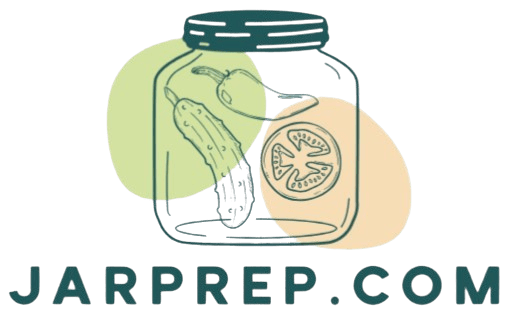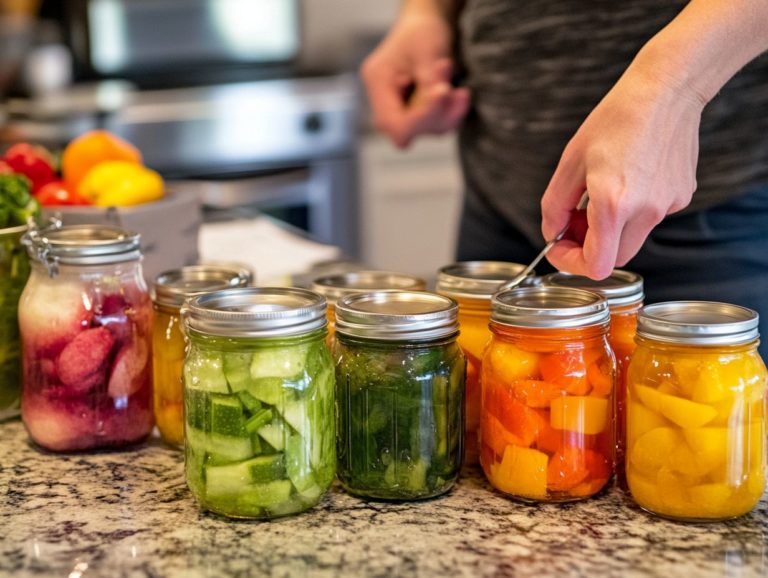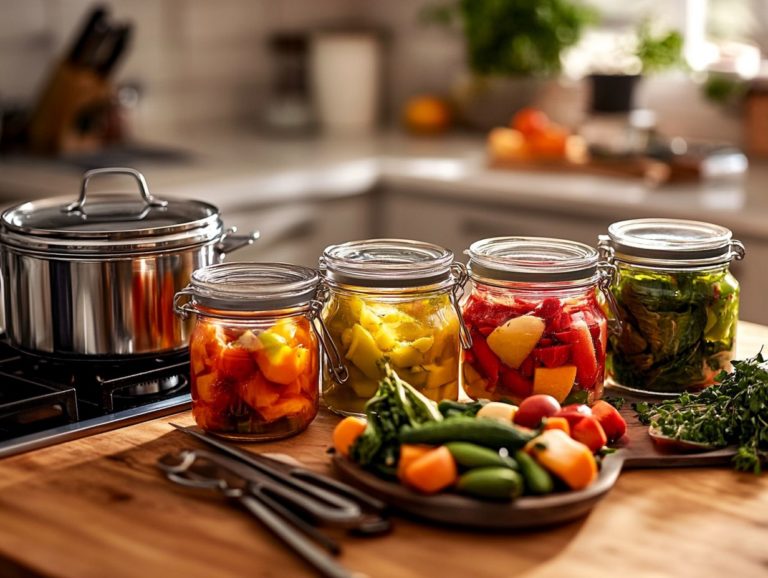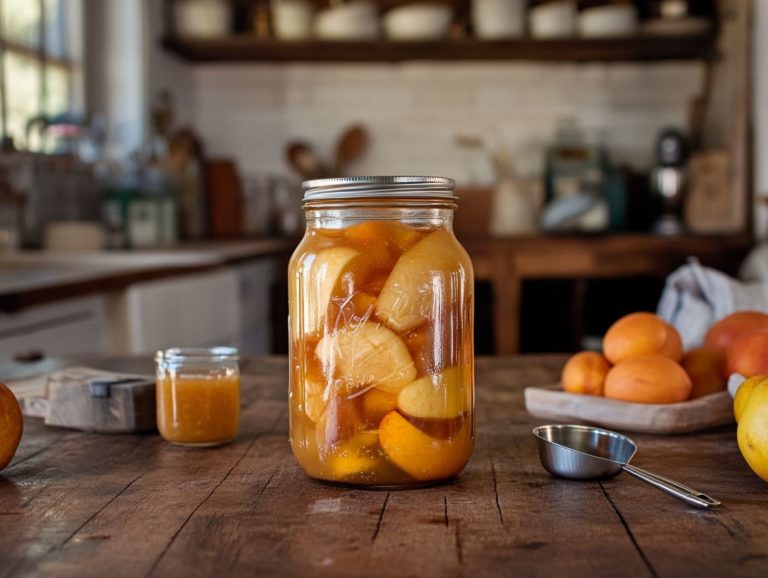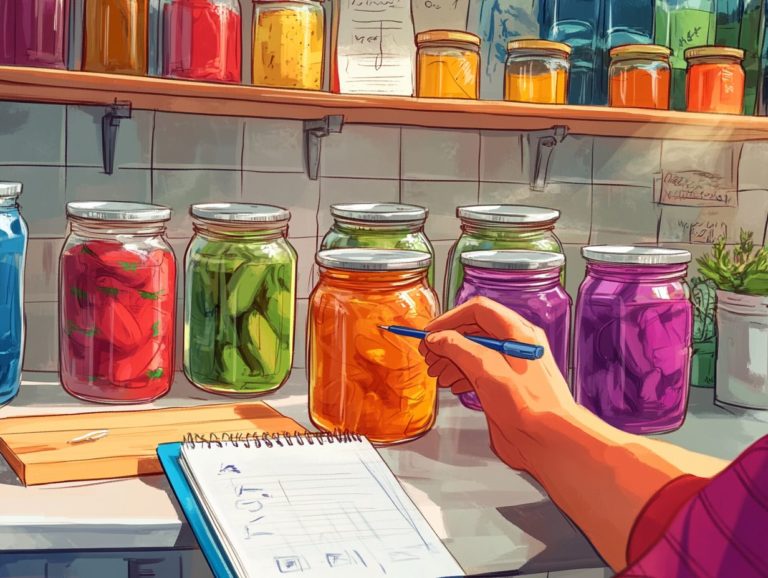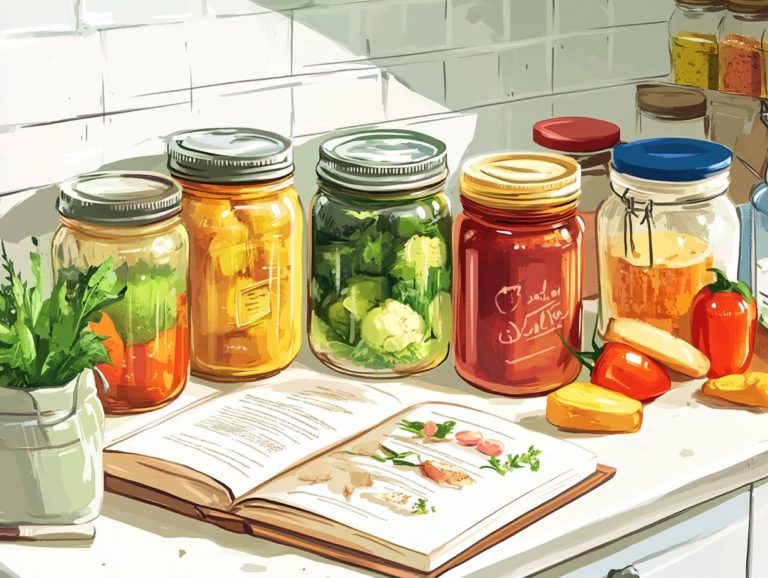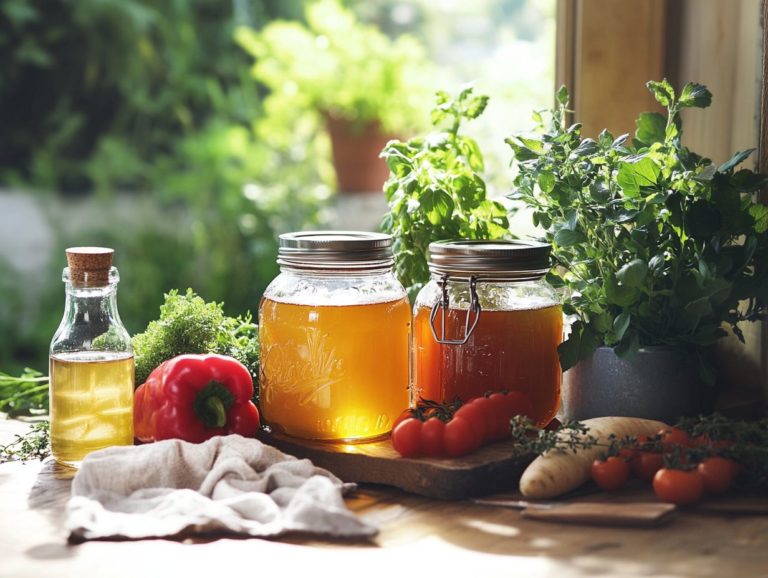What to Look for in Quality Canning Supplies
Canning is a time-honored method of preserving food. It enhances shelf life while locking in flavors and nutrients.
Whether you re a seasoned canner or just embarking on this culinary adventure, grasping the benefits of properly canned foods, understanding the essential tools and materials, and knowing how to select the right supplies is crucial.
This guide offers tips for the proper usage and maintenance of quality supplies. Prepare to elevate your home canning experience to new heights!
Contents
Key Takeaways:
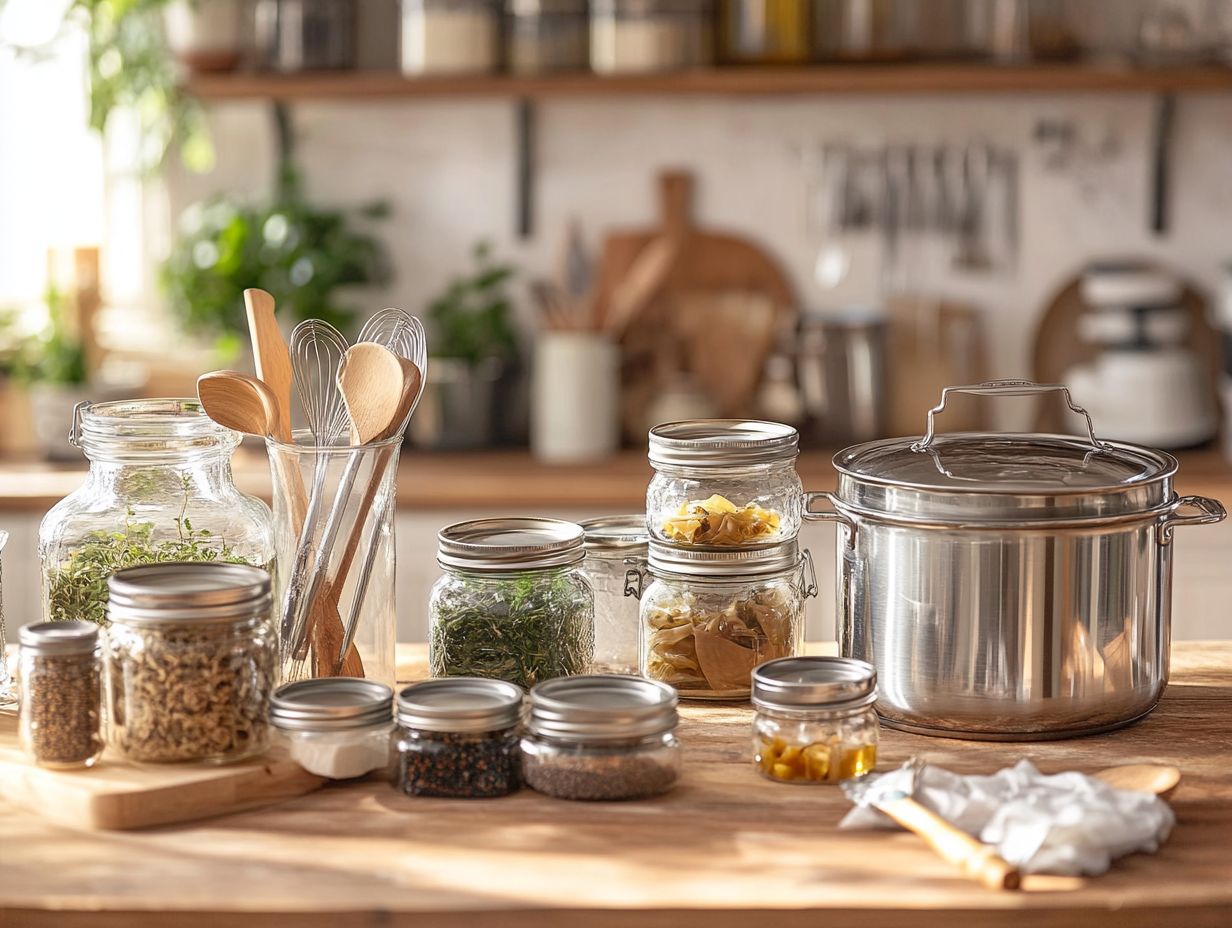
- Canned foods give you longer shelf life and keep nutrients intact.
- When choosing canning supplies, consider durability and compatibility with different foods for quality and safety.
- Whether buying from local stores or online retailers, prioritize reputable brands and materials for the best canning results.
Importance of Quality Canning Supplies
The significance of quality canning supplies cannot be emphasized enough; they are key to success in home canning and food preservation techniques that ensure safety and quality. Utilizing the right supplies guarantees that your canned goods are a delicious way to enjoy seasonal produce year-round, staying safe and delectable for an extended period and significantly reducing the risks of food spoilage and contamination.
Whether you prefer water bath canning, a method used for foods like fruits and pickles, or pressure canning, which is great for low-acid foods like vegetables and meats, investing in top-quality jars, lids, and tools is essential for getting the best results. Understanding the associated costs and seeking expert advice can elevate your canning experience, ensuring you choose the finest materials tailored to your needs.
Benefits of Properly Canned Foods
Properly canned foods offer a wealth of benefits, including an extended shelf life, enhanced flavor retention, and the ability to preserve seasonal ingredients for year-round enjoyment. Whether you’re working with high-acid foods like tomatoes and fruits or low-acid options such as vegetables and meats, home canning gives you the power to savor your favorite flavors while minimizing food waste.
By mastering canning techniques, you gain control over the quality of your canned goods, ensuring they are free from preservatives and additives. This level of control not only elevates the taste but also preserves the nutritional value of the produce, often retaining more vitamins and minerals than many store-bought alternatives.
The art of canning transforms surplus harvests into delicious relishes and sauces, creating perfect gifts or delightful treats to share.
With various methods at your disposal, from water bath to pressure canning, you can explore the unique aspects of each technique while customizing recipes to suit your personal palate. Ultimately, canning provides a fulfilling way to connect with seasonal foods, nurturing a deeper appreciation for local bounty throughout the year.
Essential Canning Supplies
When you embark on your home canning journey, having a comprehensive list of essential canning supplies is vital for your success. This includes high-quality canning jars, which are essential for effective food preservation, dependable canning lids that must be chosen carefully for a secure seal, and specialized tools designed for preparing and processing foods.
By ensuring your canning process is efficient, safe, and enjoyable, you set yourself up for a rewarding experience. Investing in reusable lids and knowing how they pair with various types of jars will add remarkable versatility to your canning setup.
Grasping these essentials not only streamlines your canning experience but also significantly enhances the quality of your preserved foods.
Get started with your canning today, and enjoy the amazing flavors of home-preserved food all year round!
Types of Canning Jars
Canning jars come in various types, each tailored to meet specific needs. Whether you’re preserving high-acid foods or storing low-acid items, renowned brands like Ball and Presto provide trusted canning supplies.
Granite Ware is known for its durable canning pots, offering a range of sizes and styles for home canners.
Understanding the differences between these jars, especially how they seal and their durability, is crucial for successful food preservation. This knowledge ensures the longevity and safety of your canned goods.
Typically made from glass, these jars come in sizes from half-pint to quart. They accommodate everything from delicious jams and jellies to tangy pickles and savory sauces.
For sealing, some jars feature a two-piece metal lid, while others might have a plastic lid with a rubber seal.
When choosing a jar, consider the type of food you’re preserving. High-acid foods like tomatoes do well in wide-mouth jars, while low-acid items, such as meats, may need jars designed for pressure canning.
Each brand offers unique benefits. Ball jars are celebrated for their durability, while Presto stands out with designs that make your canning efforts easier and more enjoyable.
Tools for Preparing and Processing Foods
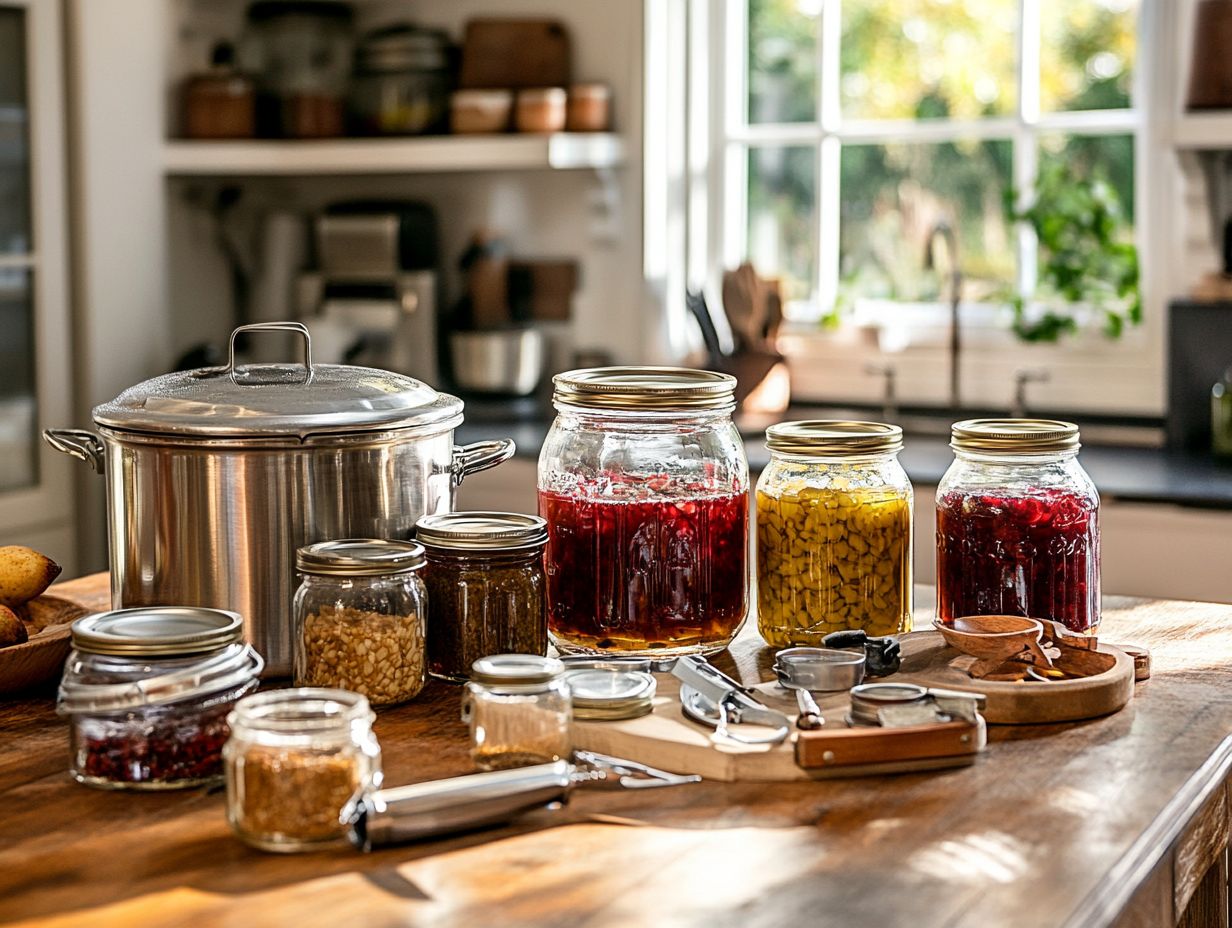
The right tools for preparing and processing foods are essential on your canning journey. They ensure that the process runs smoothly and meets food safety standards.
You need a water-bath canner for preserving high-acid foods and a pressure canner for low-acid items. Handy items like jar lifters, canning funnels, and magnetic lid lifters simplify your work and enhance safety.
Having the right canning tools reduces risks in food preservation. For example, a water-bath canner is perfect for fruits and pickles, while a pressure canner is critical for vegetables and meats.
Both methods offer benefits. Water-bath canning is straightforward, while pressure canning saves you time. Understanding your specific needs as a canner is crucial.
With the right tools, you can lower the chances of spoilage. This ensures your final product is safe, delicious, and ready for enjoyment.
Factors to Consider When Choosing Canning Supplies
When selecting canning supplies, consider critical factors for safe and effective food preservation. The materials and durability of the jars and lids must withstand the canning process.
Think about the compatibility of these supplies with the food types you plan to preserve. This will determine your method, whether you are dealing with high-acid or low-acid foods, to prevent spoilage and ensure safe consumption.
Materials and Durability
The materials you choose for canning play a significant role in their durability and effectiveness, directly influencing food safety and preservation. Glass jars are often the go-to choice because of their non-reactive properties. The quality of canning lids is equally important for achieving the perfect seal.
By understanding the strengths and weaknesses of various materials, you can make informed decisions and sidestep potential safety issues linked to low-quality products.
Metal containers offer impressive durability and frequently come with airtight seals that effectively guard against light and moisture. However, be cautious these can sometimes react with acidic foods, leading to off-putting flavors or safety concerns regarding Clostridium botulinum, a harmful bacterium that can cause serious illness.
Plastic options are lighter and less prone to breakage, but they may not provide the same airtight sealing or long-term preservation. Plus, there s the risk of chemical leaching if the plastic isn t specifically designed for canning.
By carefully evaluating these materials, you can select the most suitable supplies that align perfectly with your food preservation needs.
Compatibility with Different Foods
The compatibility of your canning supplies with various types of food is essential for both safety and the overall success of your canning endeavors.
High-acid foods, like strawberries or tomatoes, typically boast a pH level below 4.6, making them perfect candidates for preservation through water bath canning. In contrast, low-acid foods, such as green beans and beef, require pressure canning to achieve the elevated temperatures necessary for safe processing.
Understanding these distinctions is vital for anyone embarking on home canning. Using the wrong method could present serious health risks. Familiarity with pH levels not only helps you choose the right equipment but also guides your decisions regarding flavor and texture retention during the canning process, ultimately paving the way for a successful batch.
Where to Buy Quality Canning Supplies
Finding the best canning supplies is key to your success! Knowing where to purchase them can greatly enhance your efforts. You ll discover that both local stores and online retailers present a range of options, each with its own set of advantages and disadvantages.
Local stores often grant you immediate access and the chance to inspect products in person, which can be incredibly beneficial. Online retailers often boast a wider selection and potentially lower prices, making them an appealing option for canning enthusiasts.
Choosing Between Local Stores and Online Retailers
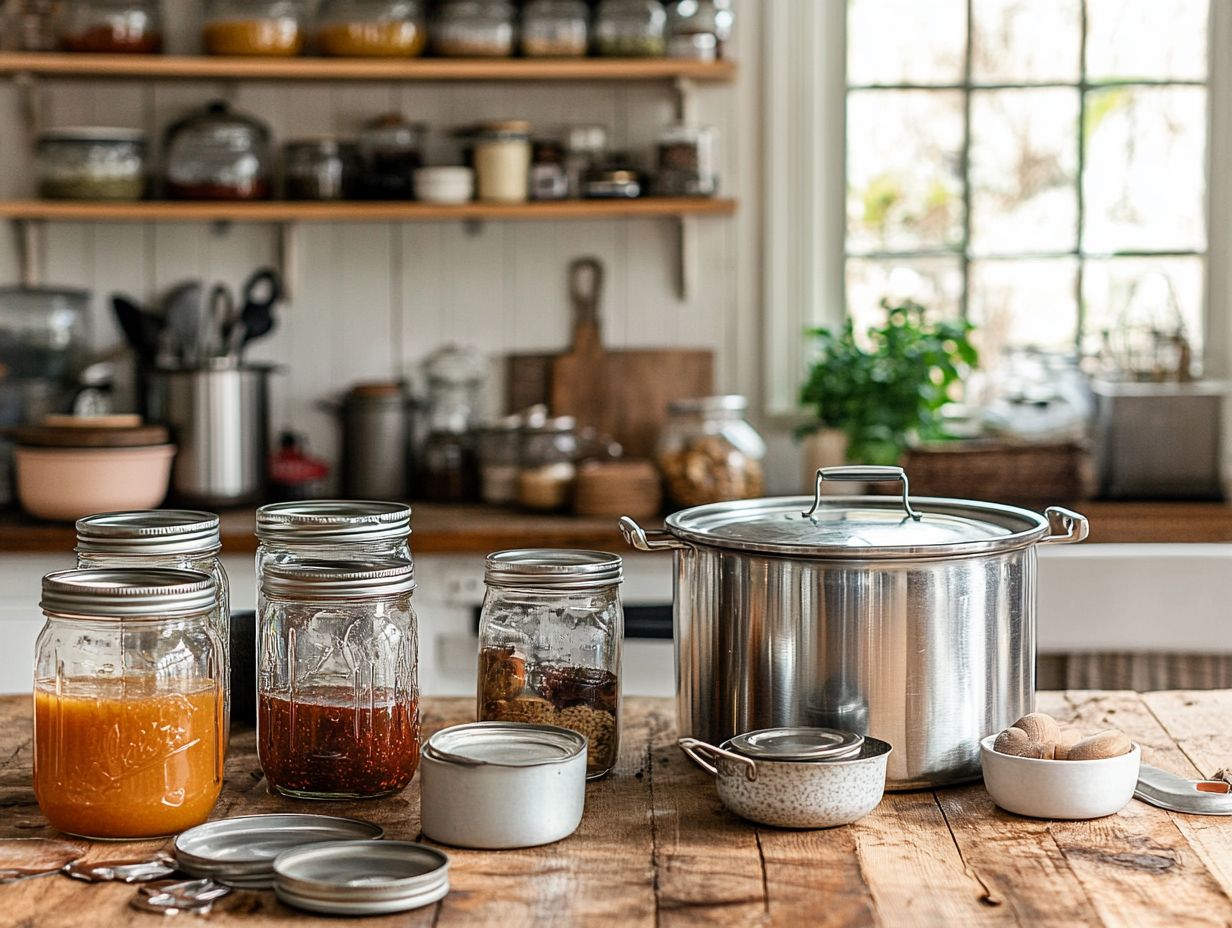
When weighing the decision between local stores and online retailers for purchasing canning supplies, it’s essential to consider the benefits and potential drawbacks of each option. Local stores offer the convenience of immediate purchase and the chance to inspect products firsthand.
Online retailers often boast a wider variety and competitive prices, which can lead to impressive deals especially when buying in bulk. Local shops often provide personalized customer service, allowing you to ask questions and receive tailored expert advice, which can be invaluable, particularly for those new to canning.
However, online platforms have their own allure, delivering items straight to your doorstep. This can save time, but be mindful of longer waiting periods and sometimes pesky shipping fees.
While local stores foster a sense of community and support small businesses, the vast selection available online can cater to niche interests and hard-to-find items. Choose wisely to create delicious preserves!
Tips for Properly Using and Maintaining Canning Supplies
Let s dive into how to keep your canning supplies in tip-top shape! The proper use and maintenance of your canning supplies are essential for achieving long-term effectiveness and ensuring food safety throughout the canning process.
Adhering to specific cleaning instructions and grasping the right storage conditions can help you prevent contamination and extend the lifespan of your canning jars and lids.
By implementing best practices, you will not only keep your supplies in peak condition but also safeguard the integrity of your preserved food items over time.
Storage and Cleaning Guidelines
Adhering to proper storage and cleaning guidelines for canning supplies is vital for preventing safety concerns and ensuring the longevity of your supplies. Thoroughly cleaning your canning jars and utensils before and after each use minimizes contamination risks, while maintaining appropriate storage conditions like keeping jars in a cool, dark place helps preserve the quality of both jars and canned goods.
It s not enough to just rinse with hot, soapy water. You should also sanitize your jars with a vinegar solution or a mild bleach mix to eliminate any lurking bacteria. Opting for stainless steel or food-grade plastic utensils can protect against harmful chemicals during the canning process.
Using good dish dryers and containers facilitates air circulation, promoting quick drying and helping to stave off mold growth.
To complete these best practices, label each jar with the date of preservation. The freshness of canned goods directly impacts safety, ensuring that what you store not only tastes fantastic but is also safe for consumption.
Frequently Asked Questions
What should I look for in quality canning supplies?
Wondering what to look for in a canning supply store? When choosing canning supplies, it’s important to look for durable materials, such as stainless steel or glass, that can withstand high temperatures and won’t break easily. Check seals and lids to ensure an airtight closure for food safety.
Are all canning jars the same?
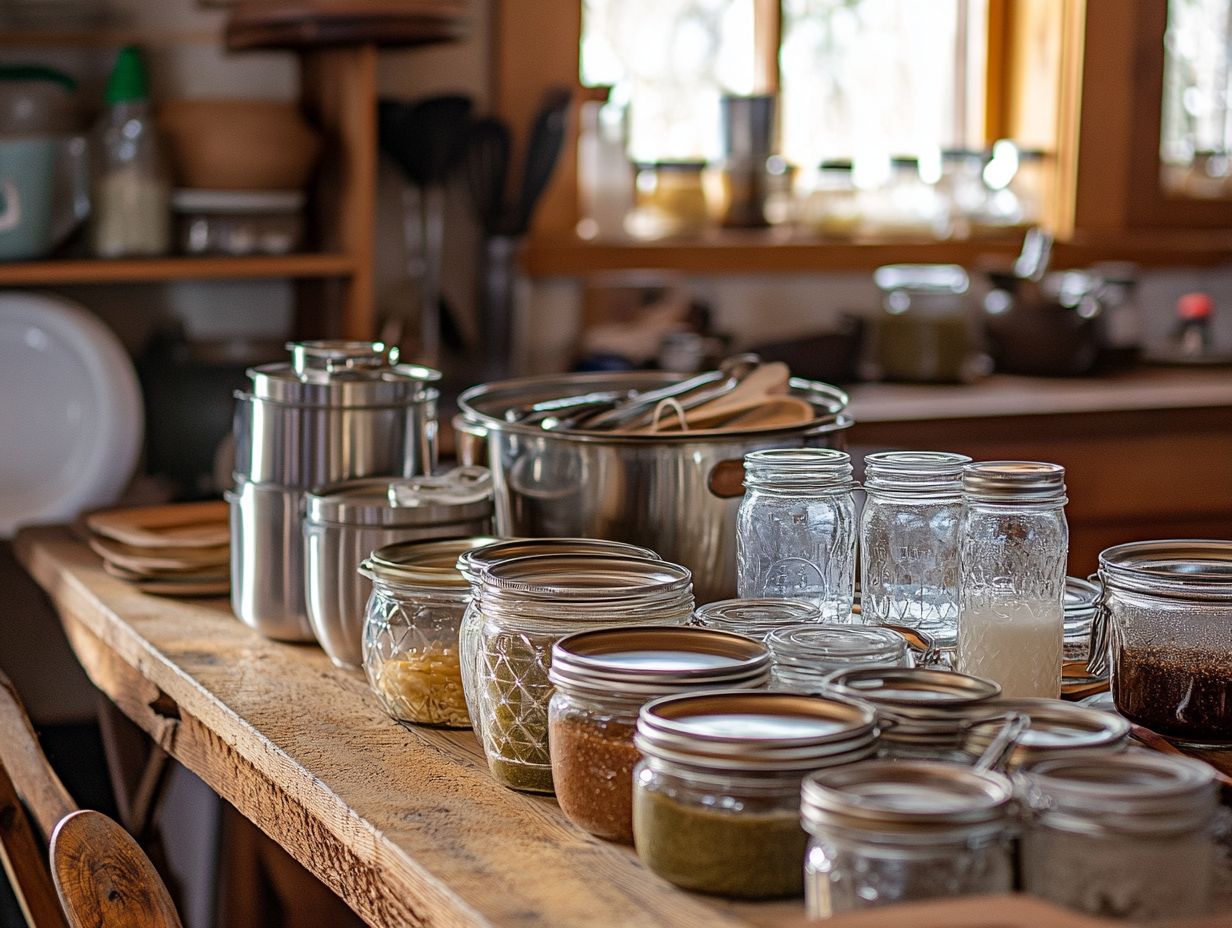
No, there are different types of canning jars available, such as regular or wide-mouth jars, as well as different sizes. It’s important to choose the right size and type for your specific canning needs. Choose wide-mouth jars for chunky or larger items, while regular jars are better for liquids or smaller items.
What features should I look for in a canning pot or kettle?
When selecting a canning pot or kettle, make sure it has a heavy bottom to prevent scorching and an easy-to-read temperature gauge. Look for a pot with a wide base to accommodate a canning rack and enough room for water to circulate around jars during processing.
Do I need a pressure canner or can I just use a water bath?
It depends on the types of food you are canning. Low-acid foods, such as vegetables, meats, and poultry, must be processed in a pressure canner a specialized pot that can create high pressure to safely preserve foods to reach safe temperatures and prevent bacterial growth. High-acid foods, like fruits and pickles, can be safely processed in a water bath.
What materials are safe for canning?
Glass, stainless steel, and food-grade plastic are all safe materials for canning. Do not use regular household jars or containers, as they may not withstand the high temperatures and pressure needed for canning. Also, avoid using aluminum or non-food grade plastic, as they can react with acidic foods and cause contamination.
How should I store my canning supplies?
Canning supplies should be stored in a cool, dry place to prevent rust or damage. Jars should be kept in a clean, dust-free area, and lids should be stored separately. It’s important to properly clean and dry your supplies before storing them to prevent any mold or bacterial growth.
